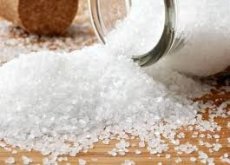WHO recalled the importance of a program to reduce salt consumption for public health
Last reviewed: 16.10.2021

All iLive content is medically reviewed or fact checked to ensure as much factual accuracy as possible.
We have strict sourcing guidelines and only link to reputable media sites, academic research institutions and, whenever possible, medically peer reviewed studies. Note that the numbers in parentheses ([1], [2], etc.) are clickable links to these studies.
If you feel that any of our content is inaccurate, out-of-date, or otherwise questionable, please select it and press Ctrl + Enter.

The World Health Organization urged all countries to participate in the program against excessive intake of salt in order to reduce the incidence and mortality from cardiovascular diseases.
In our time, non-infectious diseases, in particular diseases of the cardiovascular system, are one of the most common causes of high mortality. The World Health Organization encourages government programs to combat non-communicable diseases, which include nine main goals, including a 30% reduction in salt intake by 2025.
In the event that it is possible to reduce the level of salt consumption by the population, it will be possible to prevent millions of cardiovascular diseases and save human lives.
Salt is widely used in cooking, about 80% of salt comes into the body from products such as cheese, bread, ready-made foods, canned meat, etc.
Excessive amount of salt in the body leads to the development of hypertension, significantly increases the likelihood of heart and vascular disease.
On average, an adult consumes about 10g of salt daily, which is twice the recommended dosage. Children and adolescents are encouraged to further reduce the level of salt intake.
Salt is practically in all products that people use, and reducing the level of salt intake today is one of the most effective ways to improve the health of the population.
According to WHO recommendations, in order to reduce the level of salt consumption, it is first and foremost necessary to oblige manufacturers to reduce the amount of salt in food and beverages; conclude appropriate agreements that will promote the distribution and accessibility of products with a low salt content; create conditions for healthy eating in public places (schools, medical institutions, kindergartens, public canteens, etc.); oblige the manufacturer to apply accurate labeling to food products so that the buyer can easily determine how much salt is contained in the product. WHO also recommends controlling the production and sale of children's food and beverage products.
Consumers WHO recommends that you read the product information before purchasing (including salt content); To remove from the dining table saltcellars and bottles with sauces; Limit the addition of salt during cooking (up to 1/5 tsp in a dish per day); limit the use of foods high in salt; To promote the formation of taste in children with the help of unprocessed products and without the addition of salt.
In addition, in countries where there is an iodine deficiency, it is necessary to sell only iodized salt, which will provide additional benefits for health and development, which is especially important in childhood.
